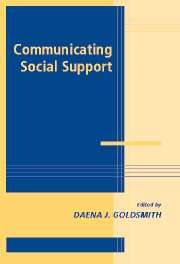Book contents
- Frontmatter
- Contents
- Acknowledgments
- Introduction
- 1 Puzzles in the Study of Enacted Social Support
- 2 Conceptualizing Enacted Support as Communication
- 3 Communicating Advice
- 4 Reexamining Matching Models of Social Support
- 5 Problematizing Provider/Recipient Roles in Troubles Talk
- 6 Conclusions and Implications
- Appendix
- References
- Index
2 - Conceptualizing Enacted Support as Communication
Published online by Cambridge University Press: 27 March 2010
- Frontmatter
- Contents
- Acknowledgments
- Introduction
- 1 Puzzles in the Study of Enacted Social Support
- 2 Conceptualizing Enacted Support as Communication
- 3 Communicating Advice
- 4 Reexamining Matching Models of Social Support
- 5 Problematizing Provider/Recipient Roles in Troubles Talk
- 6 Conclusions and Implications
- Appendix
- References
- Index
Summary
Chapter 1 explains that although there is great intuitive appeal to the notion that talking about problems with friends and family helps to buffer the negative effects of stress, the empirical support for this belief is problematic. One conclusion we might draw from this lack of empirical support is that common sense is wrong – troubles talk has less effect on coping than we think. Alternatively, studies that have attended closely to the fit between support and features of the situation, to the risks and benefits of enacted support, and to the ways in which support is communicated in conversations suggest that enacted social support can assist individuals in coping with daily hassles, acute crises, and chronic difficulties. However, the conditions under which this occurs and the characteristics of the behaviors that work appear to be complex.
To understand how and when enacted support may facilitate improved coping with stress, it is useful to reconceptualize enacted support as a communication phenomenon. By studying the communication processes that occur when support is enacted in conversation, it is possible to derive some baseline predictions about the types of behaviors support recipients are most likely to judge as positive under various conditions. It is also possible to develop general principles that can help individuals understand supportive interactions and improve their abilities to enact and negotiate social support in their close relationships. The rest of this book is devoted to elaborating and supporting these claims.
- Type
- Chapter
- Information
- Communicating Social Support , pp. 25 - 51Publisher: Cambridge University PressPrint publication year: 2004
- 2
- Cited by



